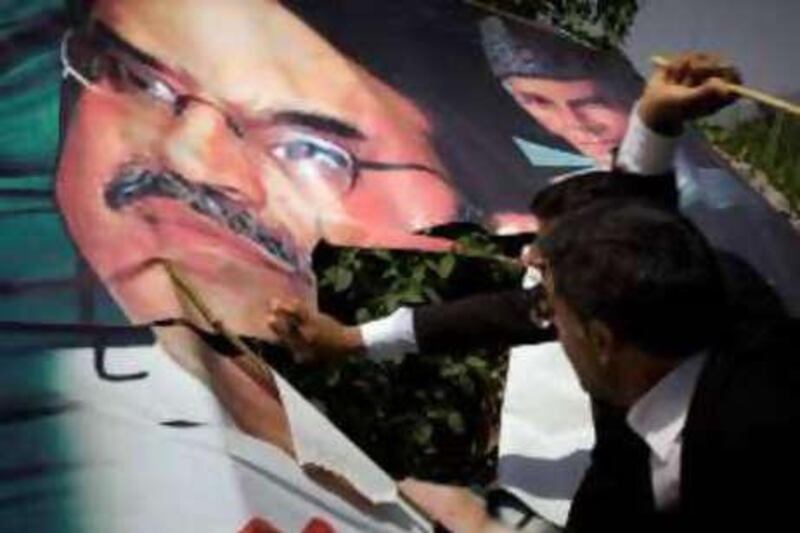Islamabad // The gloves have come off in Pakistani politics. And it appears Asif Ali Zardari, the Pakistan People's Party's candidate for president, is the one taking a beating. Mr Zardari, the widower of Pakistan's first female prime minister, Benazir Bhutto, has drawn the ire of the country's lawyers, who are demanding the reinstatement of 60 judges, sacked by the former president, Pervez Musharraf. In protests yesterday, the black-suited lawyers tore up and set fire to pictures of Mr Zardari. "Zardari's a liar," cried a small crowd in Islamabad. The PPP believes the lawyers' protests, which were also taking place in Lahore, were bankrolled by the party of Nawaz Sharif, also a former prime minister, who earlier this week withdrew his party from the coalition government over Mr Zardari's refusal to reinstate the judges. The dissolution of the coalition has led to a desperate scramble by the former partners, Mr Zardari's PPP and Nawaz Sharif's Pakistan Muslim League-N, to scoop up new allies. Always uneasy partners, the two leaders are now working quietly behind the scenes to undermine each other. Along with the lawyers' protests, the PPP also believe Mr Sharif is behind a series of negative stories that have appeared in the international media about Mr Zardari that disclosed new details of corruption allegations, unauthorised contacts with a US official and a story that questioned his mental health. The immediate contest is the presidential election on Sept 6, in which Mr Zardari is expected to win against Mr Sharif's candidate, Saeed-uz-Zaman Siddiqui, a retired judge. But the real battle is longer term. Mr Zardari wants to safeguard the government in Islamabad by securing the support of enough members of parliament to continue to hold a majority, now that Mr Sharif's seats have gone into the opposition. Meanwhile, the game for Mr Sharif is the provincial government in the Punjab, the country's most populous and richest region. Holding the Punjab is an enormously powerful position in Pakistan. Arguably, it is not possible to be in effective government in Islamabad if the Punjab is also not in the same hands. "The [central government] will not allow a different government to exist in the Punjab," said Rasul Bakhsh Rais, a politics professor at the Lahore University of Management Sciences. "That interference will lead to a further collapse in governance, opening up the possibility of the military coming back from the shadows." In the Punjab, Mr Sharif was in an alliance with the PPP, which remains intact for now at the provincial level. However, he will not allow his administration there to be held hostage by Mr Zardari, so Mr Sharif will quickly try to gather enough members of the provincial assembly from elsewhere to hold a majority without the PPP's help. The reason why it took Mr Sharif so long to break from Mr Zardari when promises were not met was because he was worried about the fate of the Punjab government. At the national and provincial elections in February, the main loser was the Pakistan Muslim League-Q, a breakaway faction of Mr Sharif's party that had been formed back in 2002 specially to support Mr Musharraf. The PML-Q had led the national and Punjab governments under Mr Musharraf and their routing at the polls was savoured by the PPP and Mr Sharif. Mr Zardari had dubbed the PML-Q the "Killer League" after the assassination of his wife, Benazir Bhutto. Now, however, the tables have turned. The PML-Q holds the balance of power. "We have been approached by both sides," said Ejaz-ul-Haq, a former PML-Q minister. "But we will remain intact." That's brave talk from the party. But, apart from a rump of hard-core Musharraf-supporters who would not be acceptable to Mr Sharif or the PPP, most of the others can be expected to jump to one of the two big parties now. The PML-Q has put up a candidate for president, Mushahid Hussain, the party's secretary-general and an accomplished politician, but this seems to be a holding position. In the dirty world of Pakistani politics, promises of positions in government and wads of cash are now likely to decide the future loyalties of the PML-Q members. The party looks set for a three-way split, going to the PPP, Mr Sharif and a tiny remnant. In central government, the PPP holds 124 seats, well short of the 172 needed for a majority. The PPP still has its other two coalition partners, the Awami National League and the Jamiat Ulema-e-Islam, but between them, they only have 20 seats. So it will have to bring in the MQM, an ethnically-based party from Karachi that was also close to Mr Musharraf. It will also need to win over a sizeable number of PML-Q members in the national parliament, to have a comfortable margin. That should not be too difficult, as politicians will gravitate towards power. In the Punjab, Mr Sharif is already strong but does not have a majority. He has 171 seats in a 371-seat house. To replace the 107 PPP members of the Punjab assembly, he needs a good chunk of the 84 PML-Q members, which should be well within his grasp. So, Mr Zardari will rule most of the country from Islamabad, but the dominant province of Punjab will be Mr Sharif's, run from Lahore. The two parties are now beginning to square off, and open hostilities can be expected to follow. A similar clash between the central government and the Punjab brought down Bhutto's first government in 1990, with the help of military intervention. Pakistan's politics are now going to be shaped by this central-Punjab friction, which could mean stability is still a long way off. @email:sshah@thenational.ae
Rivals scramble for power in Pakistan
Former coalition partners are working behind the scenes to undermine each other as the election is set for Sept 6.

Editor's picks
More from the national




